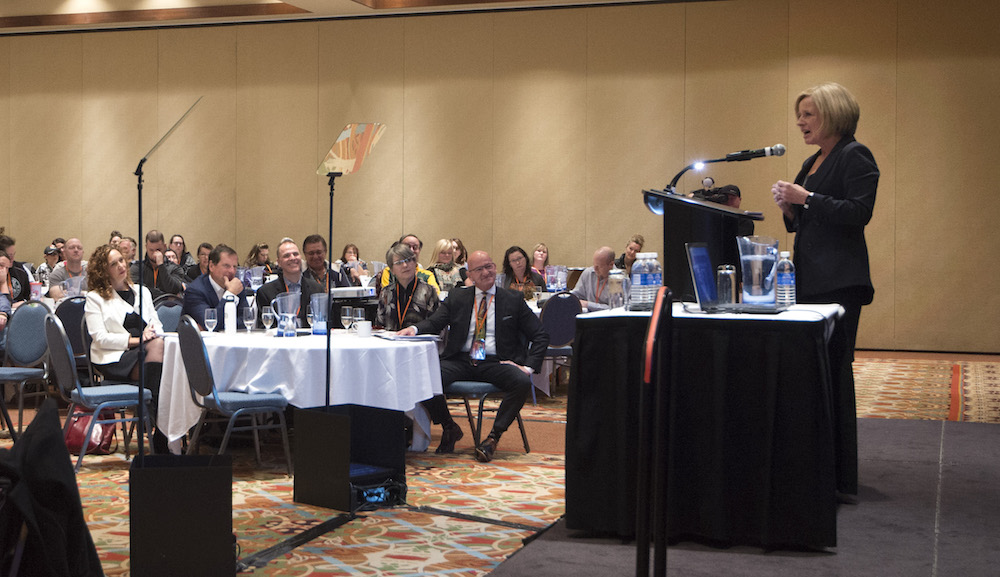Thanks to invitations from the province’s teachers’ union, the two most influential people in Alberta presented their starkly different visions of the energy future in the same room yesterday.
I speak, of course, of environmentalist Tzeporah Berman and … Premier Rachel Notley.
I jest. Berman resides in Vancouver.
Other than that, though — owing to the obsessive anger with which both women are regarded by Alberta’s right-wing opposition, still infuriated at unexpectedly losing the 2015 general election to Notley’s NDP and enraged by opposition by anyone to the pipelines most Albertans, including the premier, see as an economic panacea — this sounds about right.
This is true despite, or perhaps because of, the deep divide between the two women’s views of how the future of the energy industry in Western Canada must unfold for the sake of the planet.
The rift between Premier Notley and Berman was summed up nicely by a matched set of brisk one-liners that caught the attention of the throng of reporters who showed up yesterday morning to witness their duelling keynote speeches to about 200 social studies teachers, members of the Alberta Teachers Association, at the River Cree Resort and Casino, just west of Edmonton.
“Here in Alberta, we ride horses, not unicorns,” Premier Notley said, dismissing the notion there can be a prosperous future without pipelines to carry Alberta’s resources to the sea. “I invite pipeline opponents to saddle up on something real.”
“The idea that pipelines are answers to climate change is absurd,” Berman told a group of reporters in an informal scrum soon after the premier had departed. “You don’t buy more cigarettes to quit smoking.”
Despite their differences, though, you couldn’t exactly call this a debate. The two did not appear on stage together or respond directly to one another’s points.
There may have been a little tension in the room, but things never became uncivil. Berman listened carefully to Notley’s remarks and applauded at the end.
Having been subjected to death threats and constant vituperation for her views, Berman opened with a plea for all sides to listen to one another with respect, acknowledging that can be hard to do in debate like the one over the Trans Mountain Pipeline. At times, she observed, “the hate is so thick there can be no meaningful discussion about the future of energy policy.”
Just the same, even references to United Conservative Party Leader Jason Kenney — the climate-change-denial elephant in the room, who seems to think even listening to environmentalists is all but treasonous — were polite. For his part, Kenney was reduced to sniping via Twitter from the distant sidelines.
Notley sounded at times rather like a Progressive Conservative of yore. As it happens, she was the first serving premier to attend an ATA meeting since Peter Lougheed.
The NDP leader argued that lack of pipeline capacity is what’s causing the deep discounts in the prices fetched by Alberta’s petroleum products. As a result, she asserted, the province is losing its ability to invest in a more environmentally sustainable future.
“If we write off the jobs and the livelihoods of hundreds of thousands of working women and men, I guarantee you we will write off the ability to move forward on climate or, quite frankly, on just about any kind of progressive change,” Notley said.
Berman averred that increasing pipeline capacity is bound to increase carbon emissions. What’s more, she added, “we could build 10 pipelines and we wouldn’t fix the cost problem and we wouldn’t improve our economy.”
Both were persuasive, passionate and articulate, just as you would expect of skilled orators trained as lawyers. They had plenty of time, and larded their remarks with facts. They commanded their audience. When either spoke, you could have heard the drop of the proverbial pin.
Given their rhetorical skills, I suppose it’s no wonder the United Conservatives so relentlessly attack these two women. By contrast, despite his undeniable skills as a political operator and organizer, it’s hard to imagine Kenney looking good in a debate with either.
Still, give the man his due. Had he not worked so assiduously to demonize Berman to get at the NDP for giving her a role on its Oil Sands Working Group, and then fiercely attacked the ATA for daring to invite her to speak at yesterday’s meeting, it’s unlikely the premier would have demanded time to respond.
Speaking of credit where credit is due, Modern Resources Inc. CEO Chris Slubicki had the unenviable task of warming up the crowd with his own rather predictable 45-minute disquisition on the strengths of Alberta’s fossil fuel sector. Security was noticeable — and, in the event, not required.
To decide for themselves whether Notley or Berman was the most persuasive, readers will have to wait to read the premier’s speech in full. Berman’s was posted as soon as the event was over.
As to which is the most influential person in Alberta, readers can judge for themselves:
Notley tried to tie Berman to Kenney. “From both extremes, they will roll back action on climate and economic progress for working people.”
Via a misleading Tweet, Kenney tried to tie Berman to Notley. “In her ATA speech today, the Premier had a chance to finally apologize for ever appointing anti-energy zealot Tzeporah Berman to be her top oil sands advisor. Instead of just admitting a mistake, we heard more of the same excuses…”
I suspect both would prefer no one pays much attention to what she actually has to say.
Image: Chris Schwarz, Government of Alberta
This post also appears on David Climenhaga’s blog, AlbertaPolitiucs.ca.
Help make rabble sustainable. Please consider supporting our work with a monthly donation. Support rabble.ca today for as little as $1 per month!




